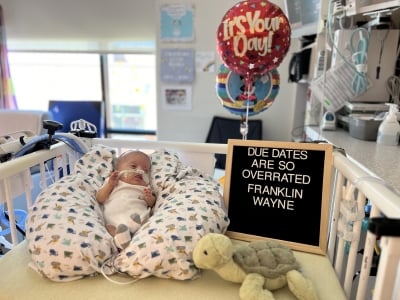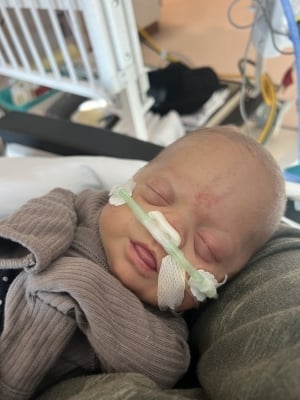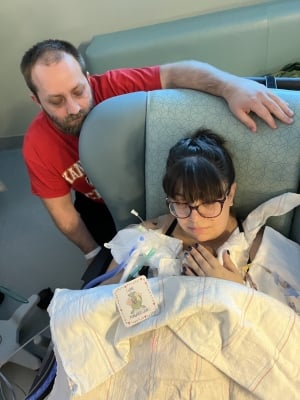Frankie’s Story: Complications of Prematurity

For the Inman family, last year started with a bang. On January 2, Josh, – a soon-to-be-dad – started a new job. Meanwhile, his wife Stevie battled HELLP syndrome, a severe type of preeclampsia that can cause significant danger for expectant moms. Later that same day, their fierce fighter, Frankie, was born via emergency C-section at 1.5 pounds and less than 26 weeks.
A challenging trek from Springfield to Kansas City
For Stevie and Josh, Frankie’s early arrival at their hometown Springfield hospital was not a complete surprise, but like many early deliveries, a bit unexpected. At their 20-week anatomy scan, they learned that Frankie only had one umbilical artery, instead of two. This affected his ability to grow at the same rate as most babies. In addition, Stevie had been through similar issues with preeclampsia before. The couple experienced the loss of their first baby, Ian, at 23 weeks’ gestation, and were afraid the same thing might happen to Frankie.
Frankie was born tiny, but stable and was able stay in the NICU close to the Inmans’ home. But just a couple of days later, “chaos happened,” Stevie said. Frankie had a pulmonary hemorrhage (bleeding in the lungs), followed by an intraventricular hemorrhage (bleeding in or around the fluid-filled parts of the brain). “The doctors told us to remain hopeful, but that he needed to be transferred to Children’s Mercy in Kansas City,” Stevie shared.
The Children’s Mercy Transport team life-flighted Frankie to the Children’s Mercy Adele Hall Campus while Josh and Stevie to get to Kansas City. “The transport team was phenomenal,” Stevie shared. “They called me at every step of the way and kept me updated.”
“What would Dr. McNellis do?”
As Frankie and his family arrived after intense travel to Children’s Mercy’s Neonatal Intensive Care Unit (NICU) in Kansas City, they had the first of many conversations with neonatologist Emily McNellis, MD. “Dr. McNellis said something to us that instilled so much peace and comfort,” Stevie recalled. “She said she would never do anything to put Frankie in harm’s way or cause him any pain, and that whatever situation came up, she would walk us through it. Dr. McNellis had such a profound impact on our lives. Even now, we still find ourselves asking, ‘What would Dr. McNellis do?’”

Frankie dealt with several different health concerns that are common among very premature babies. He was still learning how to eat and breathe, had issues with his eyesight, and battled infections, self-extubations and more.
But the most pressing concern was the impact of excessive fluid buildup around his brain. At just over 1 month old, Frankie had his first neurosurgery. “When babies are so small, you can’t put their permanent shunt in, so we do a temporary device, called a ventricular tapping reservoir, that works similarly to a shunt,” explained David Garcia, MD, Medical Director of Neurosurgery Trauma Care.
In collaboration with fellow neurosurgeon Jo Ling Goh, MD, the reservoir was replaced with a ventriculoperitoneal (VP) shunt that will grow with Frankie and continue to divert excess fluid from his brain. “Unexpected things pop up with these kiddos, and it takes a team effort to care for them,” said Dr. Garcia. “We have an amazing team of neurosurgeons who can step up and do this — that's what sets Children’s Mercy apart.”
Strangers become family
Caring for a very premature baby like Frankie takes a village, and the Inmans frequently share their gratitude for the many nurses, advanced practice providers, respiratory therapists, physical/occupational/speech therapists and physicians who have been part of his care. “The NICU team doesn’t just care for the patient, they care for the entire family,” Stevie shared. “People who started out as strangers now feel like family to us.”
Living three hours away in Springfield and trying to balance work and time with Frankie was a challenge, but Stevie and Josh always knew he was in good hands when they couldn’t be at his bedside. “The nurses would hold him, read him books — they gave him such a sense of normalcy,” Stevie said. “Everybody was so kind and loving.”

The NICU team remembers Frankie and his family fondly, too. “I connected with Frankie and his mother Stevie from the first time I took care of him,” said Molly Winegar, BSN, RN, a NICU staff nurse. “I attribute much of Frankie’s success to his mother’s continued involvement in his care. Stevie was at Frankie’s bedside doing kangaroo care every day and actively participated in his care.”
“One word I’ve always used to describe Frankie is ‘resilient,’” Molly added. “Despite many odds stacked against him, Frankie made strides every single day he was at Children’s Mercy and reached many milestones we weren’t sure he would reach. And he was such a social baby! His face lit up anytime anyone came to visit his bedside. He would sometimes stay up ’til late at night hanging out with the nurses on the pod — eventually, we had to close his curtain and cut off his social time so he would go to sleep!”
Lauren Mitchell, DNP, APRN, FNP-C, also helped with Frankie’s care in the NICU and during neurosurgery consultations and procedures. “Frankie is a sweet little boy who is always happy and smiling,” Lauren shared. “It’s nice to see him grow up and develop his fun personality. He had a prolonged hospital stay with his complex medical history, but over time, you form a bond with families and the patient, on the good days and the bad days. It has been a joy to be part of Frankie’s hospital care team and even more of a blessing to see how well he is doing now that he’s home.”
Defying the odds

After 207 days at Children’s Mercy, Frankie was finally able to head home to Springfield. “It was quite the wild journey!” Stevie shared. Frankie continues to defy the odds with meeting his milestones, including crawling so fast the family nicknamed him ‘Lightning McQueen!’
The Inman family visits multiple Children’s Mercy clinics for Frankie’s follow-up care, including the Special Care Clinic, Neurology/Neurosurgery, Ophthalmology, Physical Therapy, Feeding Therapy and Cardiology.
They’re grateful to be able to access several of these teams through our satellite clinics in Springfield and via telemedicine when appropriate. “We’re excited for the growing options for us to get Frankie’s care closer to home,” Stevie said.
Wherever they are, Frankie’s family is confident that they’ll feel at home at Children’s Mercy for many years to come. “I was not sure Frankie was going to survive, so I decided I was going to be there as often as I could, because I wanted him to know that he is loved,” Stevie shared. “Children's Mercy gave us a miracle that we never, ever expected.”